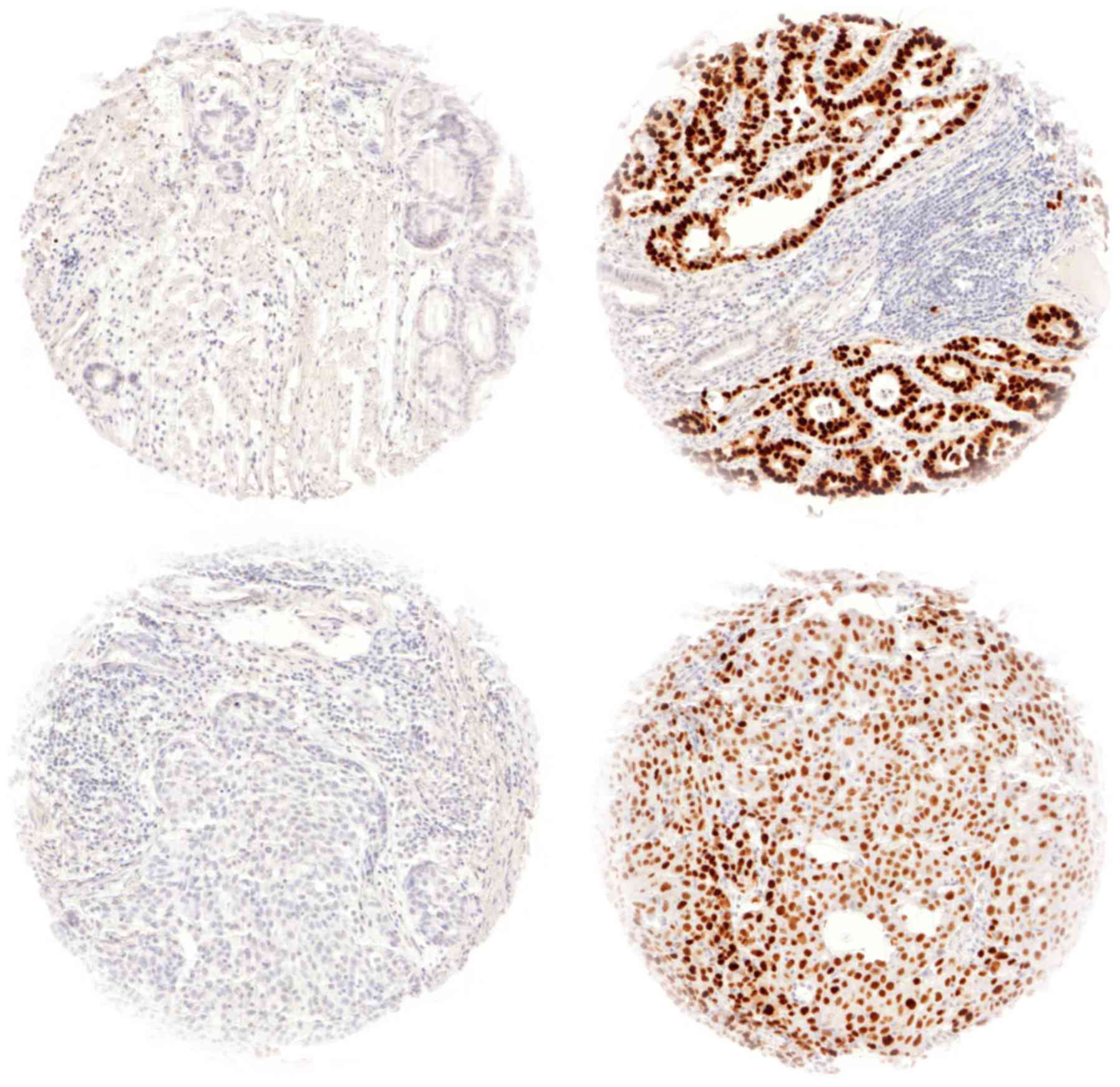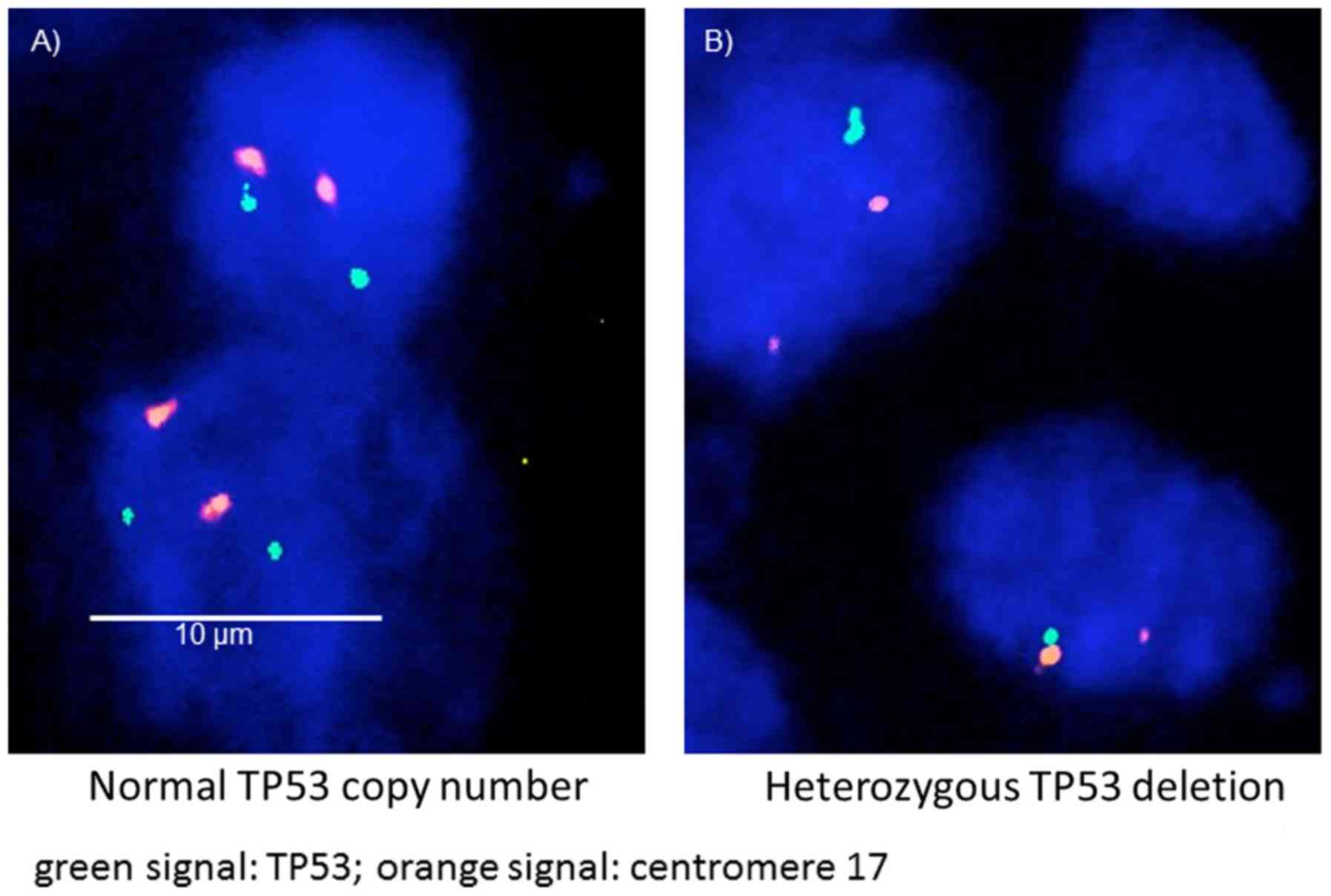|
1
|
van Hagen P, Hulshof MC, van Lanschot JJ,
Steyerberg EW, van Berge Henegouwen MI, Wijnhoven BP, Richel DJ,
Nieuwenhuijzen GA, Hospers GA, Bonenkamp JJ, et al: Preoperative
chemoradiotherapy for esophageal or junctional cancer. N Engl J
Med. 366:2074–2084. 2012. View Article : Google Scholar : PubMed/NCBI
|
|
2
|
Siegel RL, Miller KD and Jemal A: Cancer
statistics, 2015. CA Cancer J Clin. 65:5–29. 2015. View Article : Google Scholar : PubMed/NCBI
|
|
3
|
Rustgi AK and El-Serag HB: Esophageal
carcinoma. N Engl J Med. 371:2499–2509. 2014. View Article : Google Scholar : PubMed/NCBI
|
|
4
|
Bian YS, Osterheld MC, Bosman FT,
Benhattar J and Fontolliet C: p53 gene mutation and protein
accumulation during neoplastic progression in Barrett's esophagus.
Mod Pathol. 14:397–403. 2001. View Article : Google Scholar : PubMed/NCBI
|
|
5
|
Kandoth C, McLellan MD, Vandin F, Ye K,
Niu B, Lu C, Xie M, Zhang Q, McMichael JF, Wyczalkowski MA, et al:
Mutational landscape and significance across 12 major cancer types.
Nature. 502:333–339. 2013. View Article : Google Scholar : PubMed/NCBI
|
|
6
|
Dulak AM, Stojanov P, Peng S, Lawrence MS,
Fox C, Stewart C, Bandla S, Imamura Y, Schumacher SE, Shefler E, et
al: Exome and whole-genome sequencing of esophageal adenocarcinoma
identifies recurrent driver events and mutational complexity. Nat
Genet. 45:478–486. 2013. View
Article : Google Scholar : PubMed/NCBI
|
|
7
|
Lin DC, Hao JJ, Nagata Y, Xu L, Shang L,
Meng X, Sato Y, Okuno Y, Varela AM, Ding LW, et al: Genomic and
molecular characterization of esophageal squamous cell carcinoma.
Nat Genet. 46:467–473. 2014. View
Article : Google Scholar : PubMed/NCBI
|
|
8
|
Wu C, Hu Z, He Z, Jia W, Wang F, Zhou Y,
Liu Z, Zhan Q, Liu Y, Yu D, et al: Genome-wide association study
identifies three new susceptibility loci for esophageal
squamous-cell carcinoma in Chinese populations. Nat Genet.
43:679–684. 2011. View
Article : Google Scholar : PubMed/NCBI
|
|
9
|
Muller PA and Vousden KH: p53 mutations in
cancer. Nat Cell Biol. 15:2–8. 2013. View
Article : Google Scholar : PubMed/NCBI
|
|
10
|
Huang K, Chen L, Zhang J, Wu Z, Lan L,
Wang L, Lu B and Liu Y: Elevated p53 expression levels correlate
with tumor progression and poor prognosis in patients exhibiting
esophageal squamous cell carcinoma. Oncol Lett. 8:1441–1446. 2014.
View Article : Google Scholar : PubMed/NCBI
|
|
11
|
Murata A, Baba Y, Watanabe M, Shigaki H,
Miyake K, Karashima R, Imamura Y, Ida S, Ishimoto T, Iwagami S, et
al: p53 immunohistochemical expression and patient prognosis in
esophageal squamous cell carcinoma. Med Oncol. 30:7282013.
View Article : Google Scholar : PubMed/NCBI
|
|
12
|
Yao W, Qin X, Qi B, Lu J, Guo L, Liu F,
Liu S and Zhao B: Association of p53 expression with prognosis in
patients with esophageal squamous cell carcinoma. Int J Clin Exp
Pathol. 7:7158–7163. 2014.PubMed/NCBI
|
|
13
|
Blanchard P, Quero L, Pacault V,
Schlageter MH, Baruch-Hennequin V and Hennequin C: Prognostic
significance of anti-p53 and anti-KRas circulating antibodies in
esophageal cancer patients treated with chemoradiotherapy. BMC
Cancer. 12:1192012. View Article : Google Scholar : PubMed/NCBI
|
|
14
|
Chen M, Huang J, Zhu Z, Zhang J and Li K:
Systematic review and meta-analysis of tumor biomarkers in
predicting prognosis in esophageal cancer. BMC Cancer. 13:5392013.
View Article : Google Scholar : PubMed/NCBI
|
|
15
|
Dey B, Raphael V, Khonglah Y and Lynrah
KG: Immunohistochemical analysis of P53 and PRB in esophageal
squamous cell carcinoma. J Clin Diagn Res. 8:FC01–FC03.
2014.PubMed/NCBI
|
|
16
|
Madani K, Zhao R, Lim HJ and Casson AG:
Prognostic value of p53 mutations in oesophageal adenocarcinoma:
Final results of a 15-year prospective study. Eur J Cardiothorac
Surg. 37:1427–1432. 2010. View Article : Google Scholar : PubMed/NCBI
|
|
17
|
Pühringer-Oppermann F, Stahl M, Keller G
and Sarbia M: Lack of prognostic impact of p53 gene mutation and
p53 phosphorylation at serine 15 in multimodally treated
adenocarcinomas of the gastroesophageal junction. J Cancer Res Clin
Oncol. 132:433–438. 2006. View Article : Google Scholar : PubMed/NCBI
|
|
18
|
Wang ZB, Peng XZ, Chen SS, Ning FL, Du CJ,
Wang K, Ma W and Cheng YF: High p53 and MAP1 light chain 3A
co-expression predicts poor prognosis in patients with esophageal
squamous cell carcinoma. Mol Med Rep. 8:41–46. 2013. View Article : Google Scholar : PubMed/NCBI
|
|
19
|
Xu XL, Zheng WH, Tao KY, Li XX, Xu WZ,
Wang Y, Zhu SM and Mao WM: p53 is an independent prognostic factor
in operable esophageal squamous cell carcinoma: A large-scale study
with a long follow-up. Med Oncol. 31:2572014. View Article : Google Scholar : PubMed/NCBI
|
|
20
|
Niyaz M, Turghun A, Ping ZH, Zhu Z,
Sheyhedin I, Ren C and Awut I: TP53 gene deletion in esophageal
cancer tissues of patients and its clinical significance. Mol Med
Rep. 7:122–126. 2013. View Article : Google Scholar : PubMed/NCBI
|
|
21
|
Mirlacher M and Simon R: Recipient block
TMA technique. Methods Mol Biol. 664:37–44. 2010. View Article : Google Scholar : PubMed/NCBI
|
|
22
|
Kluth M, Harasimowicz S, Burkhardt L,
Grupp K, Krohn A, Prien K, Gjoni J, Haß T, Galal R, Graefen M, et
al: Clinical significance of different types of p53 gene alteration
in surgically treated prostate cancer. Int J Cancer. 135:1369–1380.
2014. View Article : Google Scholar : PubMed/NCBI
|
|
23
|
Krohn A, Diedler T, Burkhardt L, Mayer PS,
De Silva C, Meyer-Kornblum M, Kötschau D, Tennstedt P, Huang J,
Gerhäuser C, et al: Genomic deletion of PTEN is associated with
tumor progression and early PSA recurrence in ERG fusion-positive
and fusion-negative prostate cancer. Am J Pathol. 181:401–412.
2012. View Article : Google Scholar : PubMed/NCBI
|
|
24
|
Song Y, Li L, Ou Y, Gao Z, Li E, Li X,
Zhang W, Wang J, Xu L, Zhou Y, et al: Identification of genomic
alterations in oesophageal squamous cell cancer. Nature. 509:91–95.
2014. View Article : Google Scholar : PubMed/NCBI
|
|
25
|
Shang L, Liu HJ, Hao JJ, Jiang YY, Shi F,
Zhang Y, Cai Y, Xu X, Jia XM, Zhan QM and Wang MR: A panel of
overexpressed proteins for prognosis in esophageal squamous cell
carcinoma. PLoS One. 9:e1110452014. View Article : Google Scholar : PubMed/NCBI
|
|
26
|
Saemi N, Khoshnevis J, Akbari ME, Meysamie
A, Korourian A, Gholizadeh B, Larijani L, Moradi A, Baikpour M,
Baikpour M and Zham H: Evaluating the correlation between the
survival rate of patients with esophageal squamous cell carcinoma
and expression of p53 and cyclin D1 biomarkers along with other
prognostic factors. J Gastrointest Cancer. 49:35–40. 2018.
View Article : Google Scholar : PubMed/NCBI
|
|
27
|
Wang L, Yu X, Li J, Zhang Z, Hou J and Li
F: Prognostic significance of p53 expression in patients with
esophageal cancer: A meta-analysis. BMC Cancer. 16:3732016.
View Article : Google Scholar : PubMed/NCBI
|
|
28
|
Zhao Z, Wang P, Gao Y and He J: The high
expression instead of mutation of p53 is predictive of overall
survival in patients with esophageal squamous-cell carcinoma: A
meta-analysis. Cancer Med. 6:54–66. 2017. View Article : Google Scholar : PubMed/NCBI
|
|
29
|
Muller PA and Vousden KH: Mutant p53 in
cancer: New functions and therapeutic opportunities. Cancer Cell.
25:304–317. 2014. View Article : Google Scholar : PubMed/NCBI
|
|
30
|
Steurer S, Mayer PS, Adam M, Krohn A, Koop
C, Ospina-Klinck D, Tehrani AA, Simon R, Tennstedt P, Graefen M, et
al: TMPRSS2-ERG fusions are strongly linked to young patient age in
low-grade prostate cancer. Eur Urol. 66:978–981. 2014. View Article : Google Scholar : PubMed/NCBI
|
|
31
|
Sorsdahl K, Casson AG, Troster M, Van
Meyel D, Inculet R and Chambers AF: p53 and ras gene expression in
human esophageal cancer and Barrett's epithelium: A prospective
study. Cancer Detect Prev. 18:179–185. 1994.PubMed/NCBI
|
|
32
|
Leroy B, Fournier JL, Ishioka C, Monti P,
Inga A, Fronza G and Soussi T: The TP53 website: An integrative
resource centre for the TP53 mutation database and TP53 mutant
analysis. Nucleic Acids Res 41 (Database Issue). D962–D969. 2013.
View Article : Google Scholar
|
|
33
|
Brázdová M, Navrátilová L, Tichý V,
Němcová K, Lexa M, Hrstka R, Pečinka P, Adámik M, Vojtesek B,
Paleček E, et al: Preferential binding of hot spot mutant p53
proteins to supercoiled DNA in vitro and in cells. PLoS One.
8:e595672013. View Article : Google Scholar : PubMed/NCBI
|
|
34
|
Weisz L, Oren M and Rotter V:
Transcription regulation by mutant p53. Oncogene. 26:2202–2211.
2007. View Article : Google Scholar : PubMed/NCBI
|
|
35
|
Dong P, Karaayvaz M, Jia N, Kaneuchi M,
Hamada J, Watari H, Sudo S, Ju J and Sakuragi N: Mutant p53
gain-of-function induces epithelial-mesenchymal transition through
modulation of the miR-130b-ZEB1 axis. Oncogene. 32:3286–3295. 2013.
View Article : Google Scholar : PubMed/NCBI
|
|
36
|
Tucci P, Agostini M, Grespi F, Markert EK,
Terrinoni A, Vousden KH, Muller PA, Dötsch V, Kehrloesser S, Sayan
BS, et al: Loss of p63 and its microRNA-205 target results in
enhanced cell migration and metastasis in prostate cancer. Proc
Natl Acad Sci USA. 109:15312–15317. 2012. View Article : Google Scholar : PubMed/NCBI
|
|
37
|
Doyle B, Morton JP, Delaney DW, Ridgway
RA, Wilkins JA and Sansom OJ: p53 mutation and loss have different
effects on tumourigenesis in a novel mouse model of pleomorphic
rhabdomyosarcoma. J Pathol. 222:129–137. 2010. View Article : Google Scholar : PubMed/NCBI
|
|
38
|
Shimada H, Nabeya Y, Okazumi S, Matsubara
H, Funami Y, Shiratori T, Hayashi H, Takeda A and Ochiai T:
Prognostic significance of serum p53 antibody in patients with
esophageal squamous cell carcinoma. Surgery. 132:41–47. 2002.
View Article : Google Scholar : PubMed/NCBI
|
















